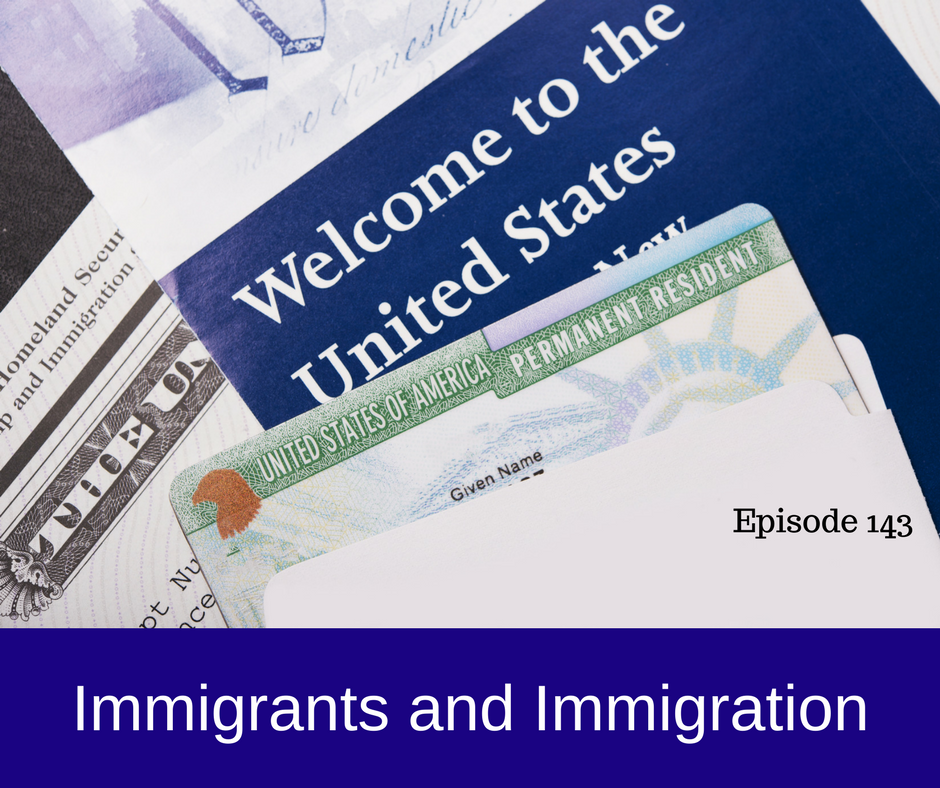
Thanks to Maite for sending us a voice message and her suggestion for an episode on immigration and homelessness.
Here’s Maite’s voice message.
Immigration is a ‘hot topic’ at the moment in the news. Syrian refugees, Brexit, Trump etc.
We recently spoke about this topic on our weekly conversation practice session. If you want to join us to practise your conversational English, follow us on Facebook and/or Twitter (@mansiontwit)
What’s the difference between immigrate and emigrate? 
What’s the difference be an ex-pat and an immigrant?
Emigrate means to leave one’s country to live in another. Immigrate is to come into another country to live permanently. Migrate is to move, like birds in the winter.
Why do people emigrate?
• To escape poverty
• To escape war
• To escape ethnic/religious persecution
• To have better job opportunities and a higher quality of life
• To have a better education for themselves or their children
• To escape the political system
• To be with someone they love
• To escape natural disasters
• To learn a foreign language
• To live in a country with a better climate
• To get to know a different culture better
Improve your speaking with an italki teacher
Do you think there is a relation between immigration and crime?
Should illegal immigrants be deported?
Do immigrants have a good or bad reputation in Spain?
Which is preferable: a multi-cultural or an integrated society?
How integrated do you feel in Spanish society and culture?
How would you define the word “home”?
How does emigration affect a country? What is ‘braindrain’?
Should anybody be allowed to emigrate from their own country whenever they want (especially if they’ve been trained by the government)?
Should immigrants be forced to learn about the culture/language of their new country?
How do you feel about Trump’s idea to build a wall between Mexico and the US?
Send us a voice message and tell us what you think. https://www.speakpipe.com/inglespodcast
Send us an email with a comment or question to [email protected] or [email protected].
If you would like more detailed shownotes, go to https://www.patreon.com/inglespodcast
Our lovely sponsors are:
Lara Arlem
Carlos Garrido
Zara Heath Picazo
Mamen
Juan Leyva Galera
Sara Jarabo
Corey Fineran from Ivy Envy Podcast
Manuel García Betegón
Jorge Jiménez
Raul Lopez
Rafael
Daniel Contreras Aladro
Manuel Tarazona
Mariel Riedemann
Maite Palacín Pérez
Lorena
Pedro Martinez
Ana Cherta
We want to thank Arminda from Madrid for continuing to transcribe full transcriptions.
Full transcriptions are now available for episodes 131, 134, 135, 136 and 138
On next week’s episode: 10 more phrasal verbs that you should know
The music in this podcast is by Pitx. The track is called ‘See You Later’



Hello Craig and Reza. 😀
I like a lot your podcasts.
Recently I found them by chance and I’ve already became in an addict.
Just for introducing myself I would like to say you that I started to learn English knowing only to say ” Ailoviu”.
I used the course of “La mansión del Inglés” on my own and I keep doing it alone. Nowadays I can, at least, to write this email with mistakes, of course. But, it’s just matter of time.
A few days ago I started to hear your funny and very good podcasts. Congratulations!. I found in this podcast something weird that I believed I had already learnt well. It’s this: Just after you named all your lovely sponsors you wrote “We want thank …”.
I’m sure it will have a good reason to not writing “We want TO thank …” so, I would love if you explain me this for keeping improving. By the way, forgive my mistakes in English but I’m just an interested learner of this language.
Thank you. 🙂
José.
Hi Jose,
That was my mistake! It should be ‘we want TO thank…’, because the verb ‘want’ is followed by the infinitive with TO. Thank you for telling us about this and I have corrected this mistake in the show notes of the last four episodes. Thank you for your kind words and I hope you keep listening to our podcasts.